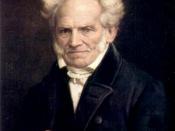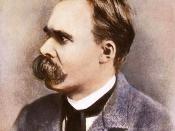As philosopher and poet Nietzsche's work is not easily conformable to the
traditional schools of thought within philosophy. However, an unmistakable concern with
the role of religion and values penetrates much of his work. Contrary to the tradition
before him, Nietzsche launches vicious diatribes against Christianity and the dualistic
philosophies he finds essentially life denying. Despite his early tutelage under the influence
of Schopenhauer's philosophy, Nietzsche later philosophy indicates a refusal to cast
existence as embroiled in pessimism but, instead, as that which should be affirmed, even in
the face of bad fortune. This essay will study in further detail Nietzsche view of
Schopenhauer and Christianity as essentially nihilistic.
Nihilism
Throughout his work Nietzsche makes extensive use of the term "nihilism". In
texts from the tradition prior to Nietzsche, the term connotes a necessary connection
between atheism and the subsequent disbelief in values. It was held the atheist regarded
the moral norms of society as merely conventional, without any justification by rational
argument. Furthermore, without a divine authority prohibiting any immoral conduct, all
appeals to morality by authority become hollow. By the atheists reckoning then, all acts
are permissible.
With Nietzsche's appearance on the scene, however, arrives the most potent
arguments denying the necessary link between atheism and nihilism. It will be
demonstrated that Nietzsche, in fact, will argue it is in the appeal to divine proscriptions
that the most virulent nihilism will attain.
There is a second sense of nihilism that appears as an outgrowth of the first that
Nietzsche appeals to in his critique of values. It contends that not only does an active,
pious, acknowledgment of a divinity foster nihilism, but also, the disingenuous worship of
a deity that has been replaced in the life man by science, too, breeds a passive...


